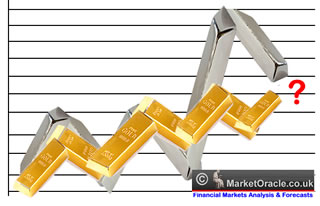Gold Pulls Back, Rumors of Greek "Non Default" But Eurozone Still "Near Death"
Commodities / Gold and Silver 2011 Jul 19, 2011 - 10:46 AM GMTBy: Ben_Traynor
 SPOT MARKET gold bullion prices dropped back to $1600 per ounce Tuesday morning in London – a 0.6% drop from yesterday's all-time high – while stock and commodity markets recovered some of the past week's losses as Europe looked ahead to this week's emergency EU summit.
SPOT MARKET gold bullion prices dropped back to $1600 per ounce Tuesday morning in London – a 0.6% drop from yesterday's all-time high – while stock and commodity markets recovered some of the past week's losses as Europe looked ahead to this week's emergency EU summit.
US Treasury bonds dipped ahead of Tuesday's Congressional vote on making balanced federal budgets part of the Constitution.
 Silver prices also fell, hitting $40 per ounce – still a 1.8% gain for the week so far.
Silver prices also fell, hitting $40 per ounce – still a 1.8% gain for the week so far.
Gold bullion in Sterling moved above £1000 per ounce in Monday's spot market trading, but is yet to reach four figures at the benchmark London Fix – set at £994 per ounce Tuesday morning.
"Although temporary setbacks are possible given the current euphoria, the climate remains favorable for gold," says Swiss precious metals group MKS.
"Gold's safe haven properties have been in play recently," says Hou Xinqiang, an analyst Jinrui Futures in Shenzhen, China.
"Europe's debt is a time bomb and while the US will eventually settle the current debt issue, there still exist a lot of uncertainties in that market."
Hou adds that gold bullion's "safe haven properties" have made it "a vital part of most people's investment portfolio" since the global economic crisis began.
German chancellor Angela Merkel will attend Thursday's emergency European Union summit on Greece, according to Bundesbank president Jens Weidmann. On Sunday Merkel said she would only go "if there is a result".
"The hope is that it's possible on Thursday to agree a package for Greece with all relevant details," Weidmann told German newspaper Handelsblatt on Tuesday.
The Reuters news agency said on Tuesday that it has obtained a confidential paper drafted ahead of the summit, showing that Eurozone ministers are considering a bank tax and cheaper, longer-dated loans as a way of raising funds to help Greece.
Such measures "would have the advantage of not making us intervene directly with the banks and therefore potentially not triggering a default," said French European Affairs Minister Jean Leonetti on Monday.
"Greece appears beyond repair, Italy is on the brink and the chances are that the Euro might be no more very soon," says Suki Mann, London-based senior credit strategist at Societe Generale.
"This should have been done over a year ago," says Harvinder Sian, Royal Bank of Scotland's European rates strategist.
"More importantly, policymakers remain well behind the curve, and are unlikely to do anything material to assist Spain and Italy."
Spanish and Italian bond prices recovered on Tuesday – pushing yields down.
Yields on 10-Year government bonds rose above 6% on Monday for Italy – while Spanish 10-Year yields also rose, hitting 6.37%.
"Spain has entered the danger zone for yields," says RBS's Sian, pointing out that yields on Greek, Irish and Portuguese debt all traded in the 6-7% range before moving substantially higher.
"The conditions for a near death experience for the Euro are in place now."
The Euro price of gold bullion has risen 9.3% since the start of the month – to around €1130 per ounce at Tuesday lunchtime in London.
"In Europe we've seen huge demand for metal in some areas," says Simon Weeks, head of precious metals at Bank of Nova Scotia.
"People have realized that gold is important as a currency."
Over in Washington meantime, the House of Representatives is due to vote Tuesday on the so-called Cut, Cap and Balance Act – which would see the US Constitution amended to state that federal budgets must be balanced.
The bill – proposed by Republicans – is part of a deficit cutting strategy, without which a vote to raise the $14.3 trillion debt ceiling is unlikely to pass Congress. The US Treasury says it will hit the ceiling in less than a fortnight, on August 2.
Enacting the bill "would essentially require the dismantlement of our social safety net: Social Security, Medicare, and Medicaid," White House spokesman Jay Carney told reporters Monday.
The Congressional Budget Office forecasts that the deficit for the current financial year will be close to $1.5 trillion – 9.8% of economic output.
On the gold bullion markets meantime, the recent gold price surge has coincided with large inflows into gold ETFs – trust funds which hold gold to back the value of their gold price-tracing shares.
The world's largest Golf ETF, SPDR Gold Trust (ticker: GLD), saw a 3.8% jump in its gold bullion holdings in the week ended Monday, taking it up to 1249 tonnes – the highest level since January 24.
By Ben Traynor
BullionVault.com
Gold price chart, no delay | Buy gold online at live prices
Editor of Gold News, the analysis and investment research site from world-leading gold ownership service BullionVault, Ben Traynor was formerly editor of the Fleet Street Letter, the UK's longest-running investment letter. A Cambridge economics graduate, he is a professional writer and editor with a specialist interest in monetary economics.
(c) BullionVault 2011
Please Note: This article is to inform your thinking, not lead it. Only you can decide the best place for your money, and any decision you make will put your money at risk. Information or data included here may have already been overtaken by events – and must be verified elsewhere – should you choose to act on it.
© 2005-2022 http://www.MarketOracle.co.uk - The Market Oracle is a FREE Daily Financial Markets Analysis & Forecasting online publication.



